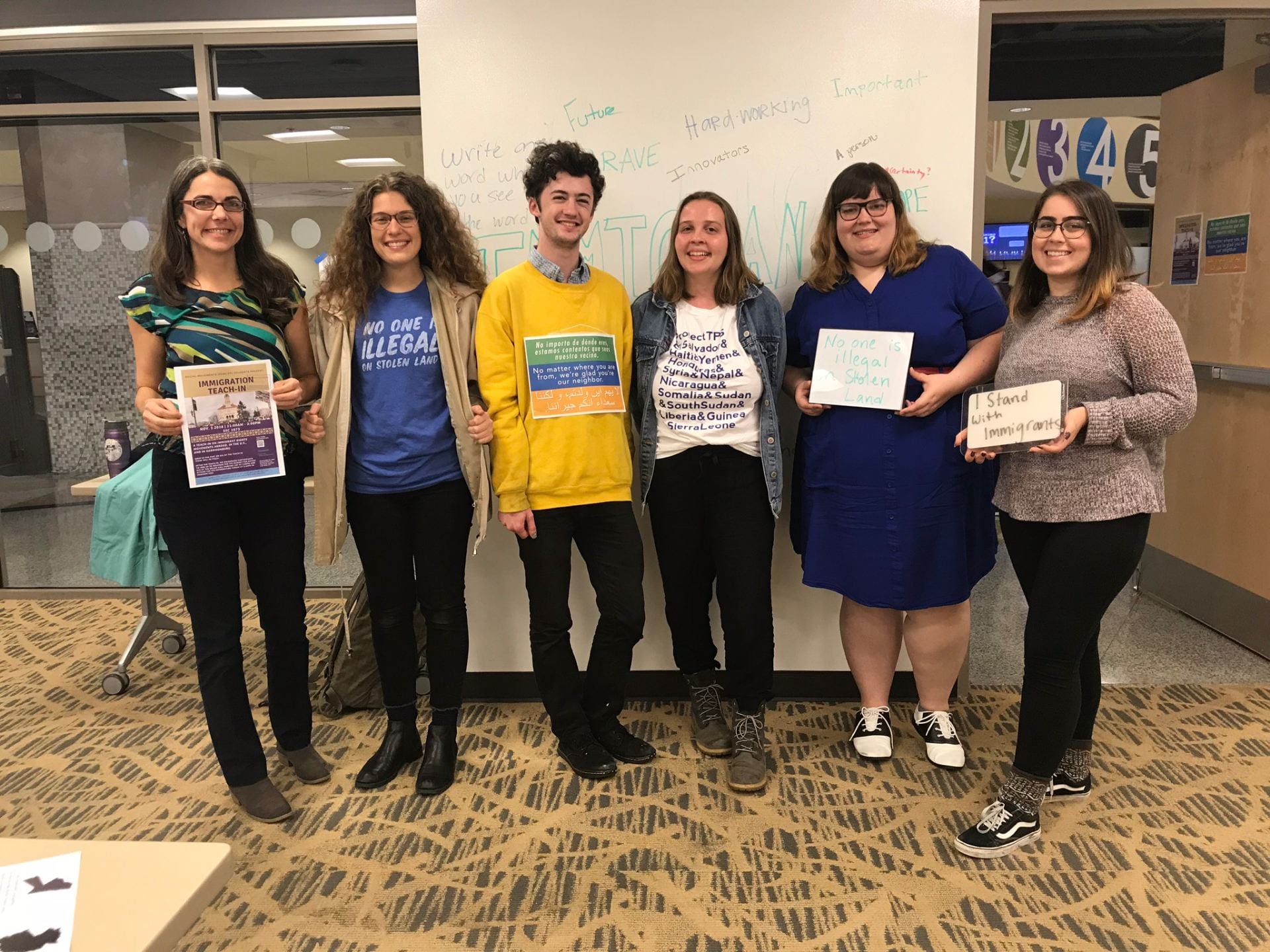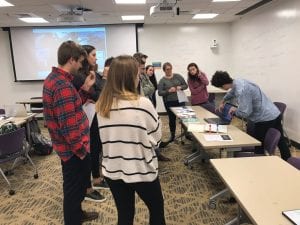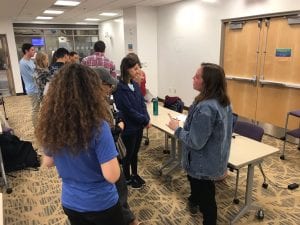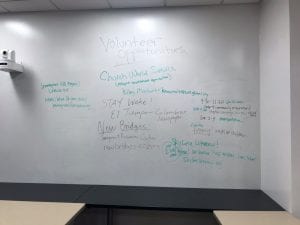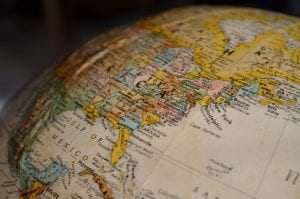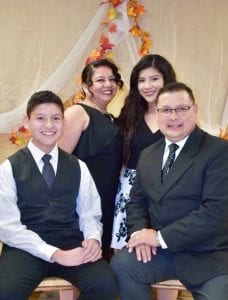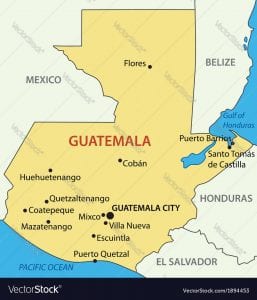Interview with Jose Carlos Ramos
By Cortni Potts and Megan Bennett
November 7, 2018 at 6 PM
MEGAN
So you’re from el Salvador
CARLOS
Yes, my country is el Salvador
MEGAN
So obviously you were born there what was the country like when you were born
CARLOS
Alright and I born in February 26 de (of) 1972 and the city is San Salvador City the capital del Salvador. My family no is de (from) capital del Salvador, my family is de (from) San Miguel City the problema (problem) de (of) San Miguel is the city that we vacation in [unintelligible] del Salvador y (and) this area is very hot, right, and the weather is very hot maybe the weather is the 40, 38 degrees Fahrenheit every time. It’s the place that my city and it is dedication a agriculture, and the corn, maiz (corn), cotton, coffee, café (coffee), and cane, sugar cane, cane azucar (sugar). It’s the [unintelligible] the problem is, this area the people the majority of people is poor, es pobre (poor), right. The majority of people poor is the area rural in the country, in el campo (country). Is that most people poor. And the city and living the people in the middle position, right, professional, doctor, and the different professionals in the city in San Miguel City. [unintelligible] the different eating, clothes, ropa (ropa), food, comida (food), and restaurant. The different area de economy, right. My infant is regular right like the play and the different play in my country and I like the soccer, right, play the soccer. Play the soccer in the area in the street in the front of my house, my neighbor and all the children and the had the group, two teams and play the game, the soccer, right. I study in my college in catholic college, right, in the catholic college. My high school in el Salvador [unintelligible] is the institute de (of) commerce de (of) San Miguel. I had my title, I don’t know my titulo (title), the, my high school, high school…
MEGAN
Diploma
CARLOS
Diploma, right, diploma. And in the area natural ciencias (natural science). I don’t know, it’s the [unintelligible] in my life is studying in university right, and I’d been studying medicine, three years, well situation de (of) economic and situation de (of) war in my country, I can’t continue study medicine. And it’s necessary to take position at change other city and the capital San Salvador City and I begin other professional and de (of) relation public. Relation public I study 4 years, right, well the situation economic that my country, I no can’t continue right. My country the problem is that the 1918, 1992, had twelve years, wars, civil wars right. The civil war maybe die 75,000 people right, in el Salvador, right. I don’t know it’s…
MEGAN
So, you studied at university in el Salvador
CARLOS
In el Salvador yes. My English my little English is working now here its studying in el Salvador and received the different model the English, English 1, English 2, English 3, the professional English and the problem is the practice okay in el Salvador no have people to practice the English, right. It’s very different only the English is very grammatical right.
MEGAN
So, when did you come to the United States
CARLOS
The United States I come here um 1999, right
MEGAN
So, after the civil wars
CARLOS
Yes in el Salvador. In el Salvador here. The question is, the 1999 a (to) 2001, I no have paper, yea, I illegal, right, okay. TPS is the program that the government and the disaster, natural disaster, and war and all this situation, in my country, Mr. President George Bush give the TPS el Salvador and el Salvador had two earthquakes, terremotos (earthquakes), earthquakes. The situation, the earthquake, hit [unintelligible] sign the TPS to el Salvador right. The beneficiary el Salvador. De (from) 2001 and this day, I had legal paper in the United States, right. And here the United States, I live in 1999 right, and in 2001 I have the position legal. For 2 year, no have paper. De (from) 2001 a (to) this day, I have the paper, right.
MEGAN
So, what was it like crossing the border without papers? And why did you come up without papers? Como cruzo la frontera? (How did you cross the border?)
CARLOS
Oh okay, the crossing the border had the different [unintelligible] right and the maybe the [unintelligible] maybe crossing in trailer, right, the trailer had the compartment, [unintelligible], I don’t know English, is separate the border de immigration you look and it look nothing right, and the deposit is down the floor de (of) the trailer. In this situation I go.
MEGAN
In the bottom of the trailer
CARLOS
Yea
MEGAN
Okay
CARLOS
In my port of entrance is Phoenix Arizona
MEGAN
Phoenix Arizona, oh okay. So it was after la Guerra Civil (civil war) in el Salvador, so why did you decide to leave in 1999 from el Salvador?
CARLOS
My first city here that I stay or…
MEGAN
Por qué sale el salvador en 1999 por los Estados Unidos? (Why did you leave El Salvador in 1999 for the United States?)
CARLOS
Okay, yes, um, my country had twenty year the war, right. They had finish the war, the economy de (of) my country is down, right. No war, criminal up, the poor up, right. The situation de (of) opportunity de (of) war in this town is not good, right. Um, in this time in this 1999, 1998, is the first years that [unintelligible] de (of) original is the los Angeles California. These people de (of) Angeles California deportation del Salvador y these people trainer old people young right. These people young no living only they living they grandfather or grandmother, why? Because the father and the mother immigration the United States the situation de (of) economic situation. No have money a (to) eating, no have money a (to) study, no have money vestir (to dress)
MEGAN
Clothes, ropas (clothes)
CARLOS
Is very [unintelligible] the problem in my country. My situation is the similar situation. I study in el Salvador and I no have maybe the level [unintelligible] my level in the country is middle, middle level right. The problem is the business of my father is down right. No have money and I had to take the position to go a United States, immigrate the United States right.
MEGAN
Did you know anyone in the United States? ¿Conozco alguien en los Estados Unidos? (Did you know anyone in the United States?)
CARLOS
Yes, in the prior de (from) my father right. My father is administration de (of) fabric. The construction de (of) material de (of) construction in el Salvador. In the area outside the city de (of) San Miguel City. And this area had the different people that live in this area, right. And cerca de (close to) fabrics, the construction. These people immigrate here in the United States maybe 1994, 1995, right. My father talk on these people, say help me, I need my son to go a United States and immigration. My business is down, I don’t have more money and I need more better future for my son. And these people they say okay, no problem. You send your son I receive here in Harrisonburg Virginia. And these people is in the similar situation no have paper, illegal right. These people working in different plants and example, Rockingham corporation, and the Wampler. Now its different name [unintelligible] and the Wampler today the name is VVEC, the corporation right. These people working in this plant, right, illegal, right. These people help me and I know, in this city I no have nothing family. In this area Virginia, I no have nothing family. My family live in Texas and New York. Only I here. My first day here in United States is very [unintelligible] I cry right. Although my preparation no is the physical work okay no mental work. Example, ustedes (you all), your preparation is mental work, right. No is physical work. Y (and) is a big change for me, right. I’m trying my TPS. I wait my social security, I waive my [unintelligible] three months, no work. Only watch TV, [unintelligible] the people that receive the document, they work is very strong. Other situation is, example, the people the other country, el Salvador, Honduras, Guatemala, no have more option, right. No have the option to study. No have the option to help the government, right. Only work y (and) work y (and) work right. Example, now, American people had to question, Carlos, you continue to study, no continue to study. My pride in this time is work no is study. It’s a big problem in the immigrant right. Example I, I had my four years, one year more y (and) graduate [unintelligible] Seattle and relation public. And for me it’s the psychological, this time is the big change right. Example I understand that only the study the university gets study in the university old people they say oh its easy, oh its easy. It’s mental preparation, it’s mental. the people no understand the situation, right.
CORTNI
So how did you, you said when you first came to the United States you were in Arizona, how was kind of the like transition from going to Arizona and ending up in Harrisonburg?
CARLOS
The travel?
MEGAN
Yea, de Phoenix Arizona a Harrisonburg, como era la… (From Phoenix Arizona to Harrisonburg, how was the…)
CARLOS
Transportation?
MEGAN
Si
CARLOS
Ah, in this, in 1999, no is problematic, the transport, right. Maybe getting home, maybe the flyer right, no problem. The problem in New York, the [unintelligible] center is more hard transportation de immigrant right. I need more document, I need ID, I need passport, and last time I go, it’s easy right. Maybe you buy the coupon a (to) go to Harrisonburg, I don’t know, maybe you remember before the [unintelligible] have the terminal here in Harrisonburg, now no. Before right, transportation [unintelligible] pass right, the boleto (ticket), here in Harrisonburg transportation.
MEGAN
Por que Harrisburg? Conoce alguien o hay trabajar, de Phoenix Arizona (Why Harrisonburg? Did you know someone or was there work? From Phoenix Arizona…), so why, how did you end up in Harrisonburg?
CARLOS
Harrisonburg, my decision de (of) transportation de (of) Harrisonburg I have a friend de (from) my father, right. There more opportunity Harrisonburg to work, right. This area, the big city is a small city, right. It’s less control the people. More work, no have distraction, no have example, casinos, no have party, no have the different situation, bar, the other big city, right. I look in the city in the first day and I say, oh I like it, the city. Its [unintelligible] problem, have work, right, y (and) I like it, the city. The other situation is I like it okay the city, its similar el Salvador right, it’s similar mountain and the rural country, it’s similar right. Only no similar is the weather (laughter).
MEGAN
So, you’ve been in Harrisonburg since 1999?
CARLOS
Yea, 1999 and 2000 we came here in the United States and we stay here, October de (of) 1999, pero (but), I repeat, de (from) 1999 a (to) 2001 the position is illegal, right. De (as of) 2001, I had the TPS right. The problem is, example, other interview they say, hey, Carlos how many time you live here in the United States. I live here 17 year in legal position with TPS. In the really, I here 19 years, right. In legal position I here 17 years. I don’t know you trying to take it, you trying to take it in 2001, you trying to take it in 1999, I don’t know.
CORTNI
How when you first came to Harrisonburg, how do you think the city kind of like received you, and has that like changed since you lived here a lot more years now?
MEGAN
¿Cómo siente recibido para la comunidad de 1999 o ahora? (How did you feel received by the community in 1999 or now?)
CARLOS
Oh okay, this city is the special city, right. I like it. It’s marvelous city, the people is marvelous people and the first day, the first year here in the United States, I no have American friends, right. Now, I have found the different [unintelligible] the benefits of community I’m talking of all the people American. Example, in [unintelligible] fathers and school de (of) my daughter and it’s [unintelligible] elementary school. It’s the first Hispanic group, it’s the first dancing group, it’s [unintelligible] right. For me, it’s marvelous right. Now have example, the TPS and have the national TPS [unintelligible] right. It’s, this state in my life is beautiful, I’m talking to other people. I have the real situation, the immigrants and the American people. Example, this interview is the [unintelligible] for you and for you and for me, right, why? You say, hey, I listen and then you [unintelligible] to these people, right. He is criminal he is [unintelligible] only bad situation. In the real, anyway, any group have bad people y good people. And the people in Harrisonburg like it, right. It’s the people muy carinoso (very caring), and the people muy (very) [unintelligible], amigos (friends), friendly city. In this area right, yea I like it.
MEGAN
What was the Hispanic community like in Harrisonburg like in 1999? La comunidad hispánico en (the community in) Harrisonburg in 1999 versus now.
CARLOS
Oh, it’s very, very big change. I remember here in Harrisonburg only have two market Hispanic, tiendas hispaña (Hispanic stores), only two. One [unintelligible] in the 11 route [unintelligible] y (and) the other is near the 11 route [unintelligible] y (and) only two market Hispanic. Now, maybe ten or fifteen and Harrisonburg market only the food mart, example, the food mart is for sell the eating product Hispanic. Before, nothing was out. Others market I remember any time buyer [unintelligible] Hispanic say chino. And then…
MEGAN
Oriental Café
CARLOS
Yea, Oriental Cafe. You see the market is very small, in this area you buy example cookie del Salvador and candy del Salvador, coffee del Salvador, different product del Salvador right. Other big change example, the people, they work in different business. Example, restaurant and example gas station and example and cleaning, medical cleaning. Before it’s not like nothing. And now you, I remember example, this is the eating and golden corral. No see people Hispanic, and now all people is Hispanic. Example you visit the [unintelligible] in the night all people is Hispanic. I don’t know maybe the people Hispanic is more in this time pero (but) this situation is [unintelligible] and the economy de Harrisonburg, right. I remember, before have only Walmart, y (and) the Walmart in the situation and now the target, right. But now have 3 Walmart, have one Aldi, have the target have the food lion, have the I don’t know the … here pero (but) the business is more big, more big, more big. Example I remember the street the Linda lane, the finish here y (and) now continue. Y (and) the [unintelligible] at school and this area, before is not only [unintelligible] it’s a good economy de this country, de (of) this city. The problem is now example, in this situation de (of) immigration the people have more fears. No example, the Hispanic people like a change occur every year right. I not happy change occur, why. Okay here maybe one year in the United States, the politic de (of) immigration and… Example [unintelligible] I no have inversion, why? Okay no have [unintelligible] one year living here or no living here. No sé (I don’t know), this problematic is no good but economy de (of) Harrisonburg, right. Wherever you looking oh, the whole [unintelligible] right. Example, I like the change the new [unintelligible]. At first right, maybe I [unintelligible] and you cooking and one year no here. Pero (but), here in Harrisonburg I repeat, the beautiful, the beautiful city and had opportunity the people they like it the work, right. The people no like the work, maybe no live in here in Harrisonburg. I look in maybe in the downtown and the afternoon, the people on the stop, the people on the poster “I am hungry,” “I am homeless.” Y (and) here, all the sites they say that they need people. One thousand [unintelligible] in six month, what? In Harrisonburg have people, Hispanic people. They like it the work, the problem is, no have legal paper, right. And the first days in my company, all the people is Hispanic people, they no have paper, only paper the people they have is the TPS. Y (and), down, down, down, quit, quit, quit, quit in the new people no like the work. Maybe people the other country, or maybe people the United States, porque (because) I’m sorry pero (but) the people the United States, I don’t know maybe the people the problem is [unintelligible] they say I American y (and) they won’t like it no work, no like it no work. No, your decision. Example for professional right, the student they say work no like it, the position I like. Pero (but) had the option cause you a student. You no student, no have nothing position. You say I no understand the people I hungry maybe the exit the route 11 the DMV, maybe in the downtown, maybe here. [unintelligible] Its inside here maybe VVEC o (or) [unintelligible] $500, $1000, or the bond was the had the application the work y (and) these people [unintelligible] y (and) maybe these people is young people, you no understand. I look in maybe Walmart, two people, two men and the one dog. It’s like, oh my god. What happened, this is America, really? What? Is America now is very crazy right, okay, okay, okay. I no understand the situation y (and) these people they say, no Hispanic people lost my work. No, I no lost my work, I work I work I work. Nothing in this is easy or need pay. Example I pay my tax, I pay my, example my daughter born in America. My daughter no have Medicaid, my daughter I have my insurance. Y (and) what happened people say, ah no, these people they [unintelligible] they pay the electric bill, they pay the water bill, they pay the taxes, they pay the Medicaid, [unintelligible] no pay nothing but I need the water.
MEGAN
So, you work in poultry, right?
CARLOS
Poultry right poultry
MEGAN
Did you get into poultry from what your dad sent you to get to America?
CARLOS
Mhm, yea
MEGAN
So you’ve been working in poultry in Harrisonburg since 1999?
CARLOS
Yea, Harrisonburg
MEGAN
What’s the industry like?
CARLOS
What like the poultry?
MEGAN
Yea, como la industria de poultry? (What is the poultry industry like)
CARLOS
Como es? (How is it?) Is very, no easy. Its very hard, maybe you look at my finger, right. My finger had the maybe … right, I had to pay … example you look. Maybe I work every time 15 grades every time, the problem, the beef maybe forty grades anytime very cold. I no had the more option, example in this kind of weather, in the snow in the morning, for me is no good. Why, okay I need maybe levantarme (wake up), wake up, more early, why because
MEGAN
Mas temprano (earlier)
CARLOS
I need [unintelligible] to clean the car and maybe looking oh my god, good or no good driver. The snow in the morning, early, for me, it’s no good. Why. Okay. I need maybe the [unintelligible]. Wake-up more early. Why.
MEGAN:
(Spanish)
CARLOS:
[unintelligible] need to clean the car, maybe looking. Oh my God, it’s good, I’m a good driver.
Laughs
CARLOS:
it’s very, [unintelligible] driving in the snow, in the morning, it is slow right. I had example no have time, example I need to go in the bathroom, el bano, say hey buddy you taking my position? No, I need [unintelligible] maybe one people, no, no, no, not in position, [unintelligible] , you say hey please I need break okay five minutes or two minutes. In town minutes to go to the bathroom. I said pee pee and come back. Right. [unintelligible] maybe the position the [unintelligible] I don’t know may other positions opposite. They take McDonalds, take the coffee, very different. Why. Example, I used at work every time, you use the book, maybe eight or nine [unintelligible] home, he say hey [unintelligible] my foot very water, no it’s not water it’s (Spanish) I don’t know english.
MEGAN:
Um like dirty? Or.
CARLOS:
Yeah (Spanish) say oh my God. it’s very hard, very hard. No more options for me. right. maybe option for me, example, my daughter have a better position for me my future. I need work for my daughter. have future more better. example my daughter, she have teacher maybe [unintelligible]
CORTNI:
Do you have any connections, like to El Salvador? Do you go back there? or talk to people that are still there?
MEGAN:
Al visitar El Salvador o tiene a conexiones en El Salvador?
CARLOS:
Oh, Okay. El Salvador. I had the TPS. Temporary [unintelligible] . You are looking in the finish letter. Not valid for reentry to USA. Right. The homeland security had one option to travel out of my country. Why this option. The option is they [unintelligible]
MEGAN:
parole
CARLOS:
This parole, I need pay this application maybe, i don’t know maybe four hundred dollar for one year, one year. I need take my fingerprints. I need take my picture. I need to recheck my record. Is there no problem, sign my parole for one year. In one year, no use the parole, no refund the money, no nothing. Had this option to travel to El Salvador, the problem is this parole and the [unintelligible] had the different [unintelligible]
MEGAN:
Okay
CARLOS:
he say, you this parole no has [unintelligible] you reenter the United States depending on the officer control the border.
MEGAN:
Okay
CARLOS:
Right. The officer control the border this day no eating or last night maybe the wife (Spanish) is angry, he say oh you no enter the United States. You come back, you can’t. You see the officer he say happy, say oh it’s okay. I like you face, come into the United States alright. I visit my country, last year.
MEGAN:
Last Year?
CARLOS:
Yeah, last year. For one month. Had maybe 18 year, no 17 year no visit to my country. Very very different. Example the children no is man, professor, maybe my family my [unintelligible] my uncle, my all very different. You look into the street [unintelligible] why. it’s very different. The situation in El Salvador now is different, it’s very dangerous in different areas. not all areas, different areas, alright. [unintelligible] maybe the [unintelligible] maybe the area of the street. Maybe you look in the, maybe you look in one main, the entrance to one street, you talk to the [unintelligible] said hey these people no live here, you check it out. theres maybe two people, he say hey where do you live. no I live with example my friend live maybe in this house, maybe die or maybe the money. Why this situation. And they call on my friend and say I visit tomorrow, alright. I sit in the entrance they [unintelligible] no problem he say oh is he your friend, okay go in the country, very very all the situation is the young, the teen year and they exit the school, they say to sell the drug, or they say hey you have part of the gang. I don’t like this, you have part of the gang, no, you no part of the gang? you die or you die for your sister or you die for your mother, or you die for your father. They say okay this part is very very difficult now in my country. maybe you look and you watching tv the caravan of people in central America. These people no have more option. no have no option. and anyway these people have bad people and good people. pero people and the children [unintelligible] example the old people no have no option right. United States the problem is no have the politic (do not understand) for good. maybe in my country, after the war I need more [unintelligible] in my country. Example, I, he say hey Carlos, you like it work in the United States is small. yes. okay. this is the visa, you work 6 months. in 6 months you come back and all the 6 months you work in the United States, in 6 months you come back. right they say my paycheck no here in the United States, my paycheck, the money in El Salvador. Work in the United States how the economy the United States [unintelligible] the economy of my country, they don’t have this option. Example he say no can the people necessary to travel to the United States [unintelligible] no have this option. No have, why. Example the administration Obama had the option the people example the children the TPS have the go here, the new administration down, quick, this option. the people don’t have no option. right the United States is the father that all countries America is the big brother they call come to America. These people. example, I working here in America, its [unintelligible] . no [unintelligible] no robbery, and the economy of America. I [unintelligible] economy of America. Right. Example, now I need change my car. I had big credit and good credit. maybe see in Toyota, Honda, hey Mr. Carlos, hey welcome, what do you need. Okay i need this car [unintelligible] they say okay no problem. How money you want down [unintelligible] down pay. Um maybe 500 dollar. Okay, no problem. And I own, and this day. Carlos have new car. no problem for have good record. The dealer, the restaurant they all tell the business no look in the people, oh no these people is immigrant, no, they look at the money. Right. In this situation not understand this president. Example you say hey, i don’t know maybe you think in the food, the hispanic food, [unintelligible] tacos, you like it , the food. they say oh my goodness, the food is very, very delicious, then American food.
Laughter
CARLOS:
[unintelligible] They say hey this food is cooking the immigrant people, I don’t care, really like it. Right you like it. you like the food. you like my work. you like my song. now you look in the song Enrique Iglesias, Shakira, Talia, the different song, in english, in spanish, Pitbull, right. You listen to his music. This music of the immigrant. I don’t care, I like it. The problem is in America is made to immigrants, why the different, the different is maybe your beautiful, you beautiful. [unintelligible] You say, example, your family, why is your grand grand father, what countries, Germany, Poland, Austria. Maybe you visited the college you say the question why is the country that you big big father. Oh my big big father is Poland, my big big father is Norway, my big big father is Germany. Oh my God nothing is America. Yeah it it is real. The people not understood these people not have the example my friend Michael [unintelligible] , the teacher in the Mennonite university he say Carlos you have more American then I, why decent is Germany, you is America [unintelligible] say why the different the immigrant. The first immigrant in United States traveled in the boat, the big boat, way entrance in New York in the island Coney island in New York and the file, what your name called, okay now United States citizen, United States citizen. Why okay this time they needed people in United States, no have people in United States. Need more people, the people is the [unintelligible] the economy. The whole country. Right. the people don’t understand the situation, the last year 22 thousand people (spanish) in the city de Eastern [unintelligible] .
MEGAN:
Eastern Europe
CARLOS:
(spanish) 22 (spanish) right. El Salvador, Honduras, caravan 3 or 2 thousand people in the [unintelligible] . have 50 thousand solider on the border. these people he say I hope the United States, the United States is the big brother. The problem is the United States no help these people no help my country, and the time the war. The United States send my country 2 million dollar, why can this time, the cold war [unintelligible] , why Nicaragua is the friend the Union Soviet. Nicaragua help the area El Salvador. He say this time Ronald Regan, they send money El Salvador, why because El Salvador de Korea de taken the problem de country South America, take the problem the Union Soviet [unintelligible] guns, [unintelligible] , fire, [unintelligible] , the war, they say Ronald Reagan maybe have Joe Bush father he say hey 2 million dollar in 10 years I no have solution. I need solution the dialog in the (do not understand) the conflict, nothing win nothing lost. Okay. The [unintelligible] El Salvador, had [unintelligible] .
MEGAN:
Peace treaty
CARLOS:
Alright. Okay. Very Good. Peace. Love and Peace in El Salvador no problem. United States [unintelligible] other country [unintelligible] more money in El Salvador economy, [unintelligible] no nothing. My daughter. [unintelligible] It’s a big problem in my country, you know in El Salvador, Honduras, Guatemala, Nicaragua, alright. Example, Guatemala no have TPS. Only Honduras, Nicaragua, El Salvador. Guatemala no have TPS. maybe you watch the news, I don’t know this year or last year, the volcano (spanish) people dying, maybe, I don’t know how the day maybe ten thousand people die, what happened to TPS, no TPS. Why. I don’t care, Guatemala is (not important) to the United States. Right. El Salvador now is the big problem, no have [unintelligible] . the people need immigrants. Okay Immigrant is the life, the universal life, example you say momma, papa I no like Harrisonburg, I immigrant say Costa Rica, or immigrant other country. Why, yeah it is my decision, okay. You immigrant, okay, you immigrant, your decision. No like it. Oh my goodness, United State very cold, maybe 10, 5, degrees. Oh my God. Right. No have more option. Say this two years old i visit a class, in elementary school, english class, have group people different country. The teacher had the question, how many time you have other partner, student for me. he say how many time you live here in the United State have 15 year [unintelligible] he say 15 years, you no speak nothing english. Hey say hey I’m sorry I have a question for you, you work? no, I no work, I cooking, I [unintelligible] my children, I clean my home, okay. You have resident? yeah I have resident. In 6 months had my resident okay. Here have 15 year living here in the United States you no have resident. Why. I don’t know its a big question for the government. These people, hispanic people, no here in United States as student here in the United States work, Why. For my children, my children need eating. You maybe don’t have document, and me take it anyway position, maybe to clean the bathroom and to clean the i don’t know. The different paper, no I don’t clean the bathroom maybe work in the station in the restaurant, I don’t know may they say this [unintelligible] why the situation, real situation, the immigrant example in my country El Salvador, right. No work, travel here the United State, they like it, have more option, no more option, the option have the rich people, example the rich people in my country no study in the United States, study in France, Germany, England, United States, no. You like it United States. You look to maybe visit other country in Europe, maybe Germany or other country, it’s very different right. you look at example the street, example the interstate 81, only two lanes. You looking two lanes, one trailer here, one trailer there. Oh my God, right. Its America, in 18 years living here in Virginia, only two lanes. I look example on internet, example in (Holland) the street is plastic, [unintelligible] no more gas car, the electric car. Why. What happened in the United States. Is the immigrant (Spanish), no the (Spanish). You and You, the future of this country, my daughter the future of this country, the women the future of this country. you know the movement MeTo, right. the MeTo, I like this movement, I like it. United State is necessary the women take it, the real position. The men is no good, the women. Example in the last election, I cried Hillary Clinton no win. What happened. Hillary Clinton had big opportunity and no win, I don’t know.
MEGAN:
Politics
CARLOS:
Politics, right, politics. example, in the JMU maybe no have the real idea the [unintelligible] . I like it the foreign the different, the interview, all people have [unintelligible] . example the country, the midwest have big problem in the war, why. in example my friend de Iraq say hey I have a question for you all right, you say Sudan Husain is a good president or a bad president, no he a good president, they pay [unintelligible] 300 hundred dollar for the people only work 60 year [unintelligible] the pension. right. the gasoline maybe 15 cents a gallon, why. you worry Sudan Husain is the bad people, the [unintelligible] people, no. This the good people. The dying the Sudan Husain taken the power over people now Iraq is down. Other problem is Libya, [unintelligible] in this control Libya. I say I don’t know if this war is very crazy, no, understand. Example my daughter last night she cry, say pap no win in Virginia.
MEGAN:
the election
CARLOS:
[unintelligible] no hija, no. is Jennifer Lewis is only one represent. This morning the congress come to the (democrats) [unintelligible] . I don’t know. Why do you think?
